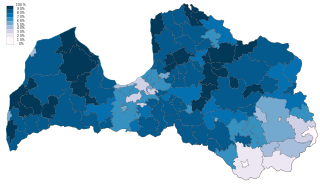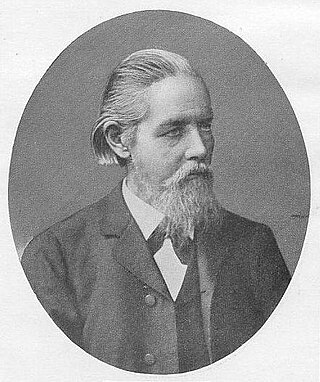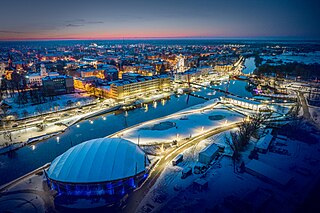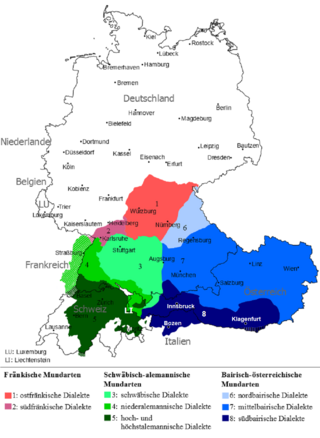
Jacob Ludwig Karl Grimm, also known as Ludwig Karl, was a German author, linguist, philologist, jurist, and folklorist. He formulated Grimm's law of linguistics, and was the co-author of the Deutsches Wörterbuch, the author of Deutsche Mythologie, and the editor of Grimms' Fairy Tales. He was the older brother of Wilhelm Grimm; together, they were the literary duo known as the Brothers Grimm.

Latvian, also known as Lettish, is an East Baltic language belonging to the Indo-European language family. It belongs to the Baltic subbranch of the Balto-Slavic branch of the family and it is spoken in the Baltic region. It is the language of Latvians and the official language of Latvia as well as one of the official languages of the European Union. There are about 1.2 million native Latvian speakers in Latvia and 100,000 abroad. Altogether, 2 million, or 80% of the population of Latvia, spoke Latvian in the 2000s, before the total number of inhabitants of Latvia slipped to 1.8 million in 2022. Of those, around 1.16 million or 62% of Latvia's population used it as their primary language at home, though excluding the Latgale and Riga regions it is spoken as a native language in villages and towns by over 90% of the population.

Friedrich Blass was a German classical scholar.

Jelgava is a state city in central Latvia about 41 kilometres southwest of Riga. It is the largest town in the region of Zemgale (Semigalia). Jelgava was the capital of the united Duchy of Courland and Semigallia (1578–1795) and was the administrative center of the Courland Governorate (1795–1918).

Heymann,Hermann or Chajim Steinthal was a German philologist and philosopher.

East Franconian or Mainfränkisch, usually referred to as Franconian in German, is a dialect which is spoken in Franconia, the northern part of the federal state of Bavaria and other areas in Germany around Nuremberg, Bamberg, Coburg, Würzburg, Hof, Bayreuth, Meiningen, Bad Mergentheim, and Crailsheim. The major subgroups are Unterostfränkisch, Oberostfränkisch and Südostfränkisch.

August Johann Gottfried Bielenstein was a Baltic German linguist, folklorist, ethnographer, and theologian.
Friedrich (von) Spiegel was a German orientalist. He was one of the pioneers in the field of Iranian philology.
The Latvian Literary Society, also called The Society of Latvian Friends was founded in 1824 by Baltic Germans, mainly pastors. The goal of the Society was to investigate the Latvian language, folklore and culture. At the time, when the Society was organized, hardly any Latvian educated in a higher education existed, and nobody researched their language or folklore.
David Caspari was a German Lutheran theologian. He was the father of Georg Caspari.
Georg Caspari was a Baltic German academic.

Alsunga Castle is a castle in Alsunga village, in Alsunga Parish, Kuldīga Municipality in the Courland region of Latvia. It was built for the Livonian Order during the first half of the 14th century.
Ernst Friedrich Ockel was Lutheran theologian, writer and politician from the duchy of Courland (Latvia), born 16 November 1742, in Mengeringhausen (Waldeck).
Georg Heinrich Ferdinand Nesselmann was a German orientalist, a philologist with interests in Baltic languages, and a mathematics historian.
Johann von Kelle was a German philologist who studied the German language.

Johann Friedrich von Recke was a senior public official in the Baltic Germans Duchy of Courland. He is remembered now, primarily, for his activities as an antiquarian and collector.
Georg Mancelius was a Baltic German Lutheran theologian in what is now Latvia. He wrote the first dictionary of the Latvian language. From 1635 to 1636 he was Vice Rector of the University of Tartu and from 1636 Rector.
Baltistics, also referred to as Baltic studies, is a multidisciplinary study of the language and culture of the Baltic nations. Baltistics by its subject splits into Lithuanistics, Latvistics, Prussistics, etc. Special attention is paid to the language studies, especially to the reconstruction of the Proto-Baltic language, which some linguists have argued is the same as the Proto-Balto-Slavic language. Currently there are about 30 centres of Baltistics, most of them based in Europe, the University of Vilnius considered to be the most active centre.

Friedrich Konrad Griepenkerl, sometimes known as Friedrich Konrad Griepenkerl, was a German Germanist, pedagogue, musicologist and conductor.
Solomon Pucher was an Imperial Russian religious leader, who served as rabbi of Mitau and Riga.










